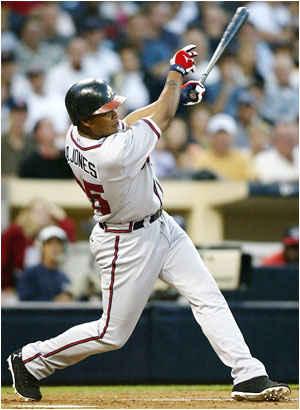 On Monday, we presented a simple, unscientific way of evaluating free agent signings within baseball’s current economic landscape. To recap, we put each deal through five quick tests:
On Monday, we presented a simple, unscientific way of evaluating free agent signings within baseball’s current economic landscape. To recap, we put each deal through five quick tests:
- Is this player likely to make his team significantly better in 2008?
- Is this player’s performance likely to hold up at a reasonable level through the life of the contract?
- Could the team have found the same level of performance in 2008 at a lower price?
- Could the team have improved itself more in 2008 by using that money in other areas?
- Will the contract hurt the team’s ability to compete in the future?
If the signing passes all five, it’s a clear thumbs up. Failing even one makes it questionable. We gave our seal of approval to the A-Rod deal, a grudging thumbs down to Torii Hunter, and a clear failing grade to the Reds for the Francisco Cordero contract.
So what about the rest of this free agent class? Which players are most likely to pass, and which are most likely to fail?
If any player could be a steal, it’s Andruw Jones. Overrated in the past (offensively, at least), Andruw had a disastrous 2007 season, hitting .222/.311/.413. He’s a Boras client, so this prediction should be taken with a grain of salt, but he is still a high quality player who could be had at a discounted rate (either in terms of years, or annual salary given a longer deal). Expect him either to take a short (i.e. three years) deal with higher pay… or a mega-deal that only Boras is capable of.
The other choices, albeit on a smaller scale, are all projects: Milton Bradley with his torn ACL, Mike Cameron with a suspension hanging over his head, and Barry Bonds, possibly looking at jail time.
And the bad bets? Pitchers. As we’ve covered, pitchers will almost always be overvalued in the free agent market. Someone will pay Livan Hernandez, hoping he’s effective in 2011. Carlos Silva and Kyle Lohse could get even longer deals. Pitchers are generally overpaid as a whole, but particularly so in long-term contracts when each has inherent health risks based on the violent nature of their jobs.
But pitchers aren’t alone. There are hitters on this market that don’t project well long term. This includes Jose Guillen and Aaron Rowand, both of whom will be hard pressed to match their 2007 performances. Signing hitters is more risk averse, on the whole, than signing pitchers, but this assumes that aging patterns (which are more useful for hitters) are applied. Instead, most free agents are valued based on their past performance, instead of their future performance.
Feedback? Write a comment, or e-mail the author at shawn(AT)squawkingbaseball.com
Add New Comment